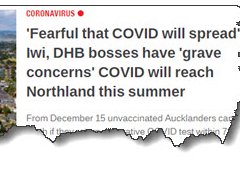Home : Research Results : Majority don't want to wait for 90% of Māori to get vaccine
Research Results
Majority don't want to wait for 90% of Māori to get vaccine
13 Dec 21

A majority of New Zealanders do not want the movement of all people restricted until 90% of Māori aged 12+ have been vaccinated against COVID-19.
A nationwide Horizon Research survey of 1,023 adults between November 30 and December 6, 2021, found 59% of adults don’t agree with restricting movement for this reason, 32% agree and 9% are unsure.

Among Māori, the figures are similar: 33% agree with restricting movement, 54% disagree while 13% don’t know.
The survey was conducted after health experts expressed concern that Māori are more vulnerable to infection, serious illness and death if infected with COVID-19.
They said Māori had higher rates of most diseases and many Māori live in communities where vaccination rates are currently lower than the national average, and access to health services is limited. In the 1918 flu pandemic one in every 20 Māori died. Māori health experts say they are worried this could happen again.

However, while there have been strong calls to protect Māori populations in some regions, like Northland and the Bay of Plenty, where there were many unvaccinated Māori at the time of the survey, a majority of people living there disagree with the idea of restricting their movement to do that.
In Northland, 73% disagree, 21% agree on the need for restrictions.
In the Bay of Plenty 70% disagree and 26% agree.
Highest agreement with restricting movement is in Otago (55%), the West Coast of the South Island (52%) and Wellington (42%).
By ethnicity, highest agreement is among Pasifika 53%, Indians 51% and Asians 47%. But among Pākehā Europeans only 30% agree and other among Europeans (born outside New Zealand) 34% agree.
The survey was conducted by Horizon in the public interest in association with Auckland University’s School of Population Health.
 Professor Chris Bullen (pictured), a Professor of Public Health at the University of Auckland’s School of Population Health, says the research reflects a desire by many people to get back to life as it used to be before COVID.
Professor Chris Bullen (pictured), a Professor of Public Health at the University of Auckland’s School of Population Health, says the research reflects a desire by many people to get back to life as it used to be before COVID.
However, he says this attitude could pose risks for as-yet-unvaccinated Māori and ultimately prove to be risky for everyone.
In another survey question, only 19% supported delaying more movement to help protect the unvaccinated generally, not just unvaccinated Māori.
Some 13% thought more movement of people would encourage people to get vaccinated and 17% agreed with the statement: Just allow more movement of people, using vaccine passport and other measures, to help protect unvaccinated people.
Professor Bullen said the concern that greater movement might lead to a rise in COVID-19 infections of unvaccinated and vulnerable groups within the population is a valid one.
“However, this survey finds people want to be able to move, think the traffic light framework protections will work, and freer movement will prompt the unvaccinated to get vaccine protection.
“Official modelling warns of a worse-case scenario of up to 16,000 COVID-19 infections a week nationwide, even if 90% of the population aged 12 or older is fully vaccinated.
“We haven’t reached 90% yet – and we’re going to need to take care to protect each other even when we do, and protect ourselves and others as Auckland’s borders come down on December 15.
“When that happens, especially during Christmas and New Year, many people will travel from and to all parts of the country.”
Results of the online Horizon survey are weighted by age, gender, ethnicity, region, employment status and education level. At a 95% confidence level the maximum overall margin of error is +/- 3%
For further comment please contact:
Professor Chris Bullen, Professor of Public Health at the University of Auckland’s School of Population Health, email c.bullen@auckland.ac.nz, telephone 021 425 267.
For further information please contact:
Andrew Stevenson, Manager, Horizon Research, email Andrew.stevenson@
HorizonPoll Online Survey system
and website developed by BEWEB
Copyright © 2010. HorizonPoll incorporating ShapeNZ - Listening to New Zealand


